SUMMARY
This is AI generated summarization, which may have errors. For context, always refer to the full article.
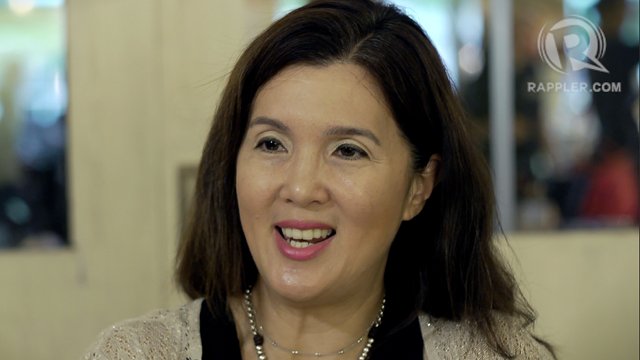
MANILA, Philippines – “We do not have the brick wall but we have the glass ceiling.”
This is how Senator Pia Cayetano situates women empowerment in the Philippines, a country that ranks high in gender equality surveys but ironically lags behind development goals on women.
The women’s rights advocate said this “glass ceiling” helps explains a report released in August that shows that the Philippines has a low chance of meeting the United Nations Millennium Development Goal (MDG) on gender equality in political participation. The MDGs are a 15-year, anti-poverty roadmap set to expire next year.
“That glass ceiling was put in place by traditions and customs, which basically tell us all that women are the primary caregivers in the home. This is the number one deterrent for women stepping up and taking positions both in government and the private sector, and I say this is worldwide. More regional and Filipino is the thinking that, ‘Oh, you should really stay at home.’”
A lawyer, entrepreneur and triathlete, Cayetano admits that opportunities for women remain limited, with mostly those from wealthy and famous families like hers able to reach the top rungs of business and government.
The principal sponsor of the landmark Reproductive Health (RH) law also expresses disappointment that the Philippines is in danger of missing the MDG on maternal mortality, which even increased to 221 per 100,000 live births in 2011. Still, she is hopeful that the implementation of the law will save the lives of mothers.
“We still are a country that lives in poverty. Millions of our women are poor. Many of them have to make the choice as to who of their kids will eat breakfast today, who will have lunch, and if any of them will have dinner and if they do, she won’t. So for a woman to have to make that choice, definitely, contraceptives are the last thing she’s gonna pay for. She’s just gonna close her eyes and hope to God that she doesn’t get pregnant. That is why I strongly felt that government must step up.”
In a wide-ranging interview with Rappler, Cayetano discusses her work to amend discriminatory provisions in the Family Code, and the odds for abortion and divorce in a predominantly Catholic country with an influential and vocal Church hierarchy.
What’s it like being a female legislator pushing for women’s rights in the Philippines? Watch our interview and read the excerpts below:
Observers say gender equality here is a contradiction. We fare well in global surveys but the picture isn’t actually that rosy. What’s your take?
I’m not always comfortable with these surveys. To me, it’s sometimes very misleading and deceiving because it’s possible that for example, when they rank, is the question: do you have sufficient laws? And we do have very strong laws, especially with the passage, first of the Magna Carta for Women and then after that the Reproductive Health law so we probably might get 10 stars when it comes to the passage of laws. Believe me, you’ll see all the policies.
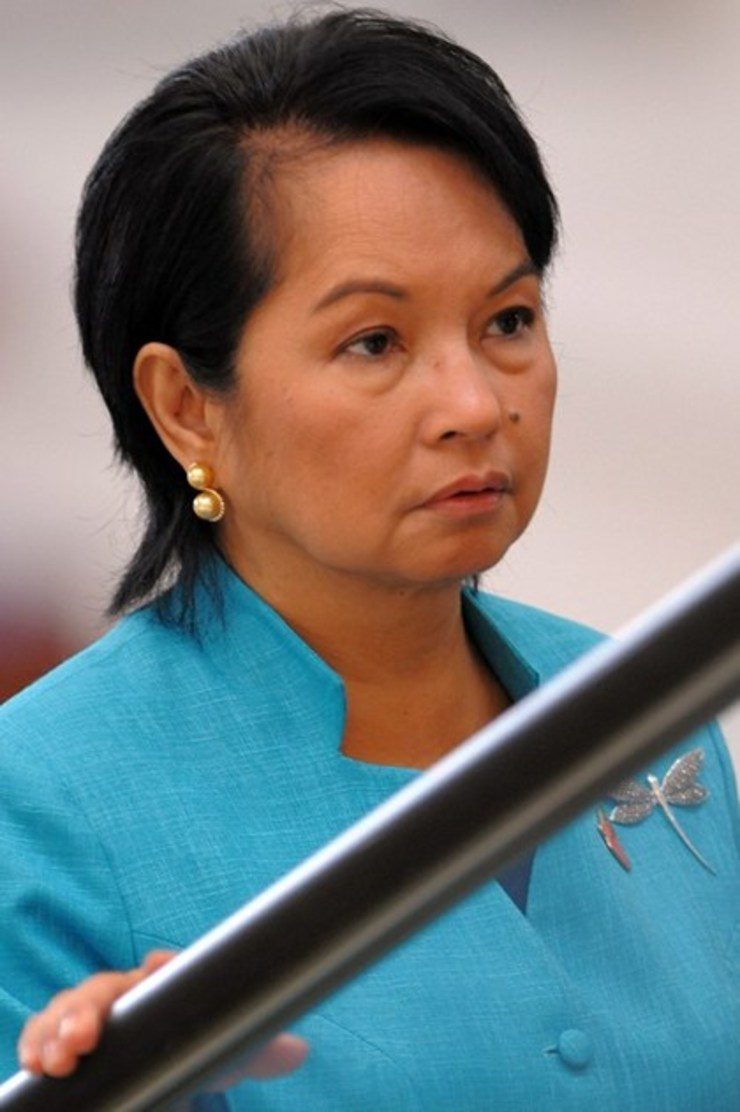
But if you look deeper, during the time of GMA (former President Gloria Macapagal-Arroyo), she was very anti-Reproductive Health. This was reflected in the practices and the budget of the Department of Health so if that survey did not have certain indicators like what is the budget you provide for ensuring women have access to contraceptives or reproductive health, then the indicators you might be using will show we’re stellar.
Another example is the area of political maturity in terms of accepting women leaders. We do have very empowered women in both the private sector and the public sector. In the private sector, no doubt, hands down, in Asia, we have quite a few women here. But if you look at it, and this does not in any way diminish their personal achievements, a lot of them are daughters of taipans. In the same way, I will say that if people look at me as a successful, empowered woman politician, I am a daughter of a former male politician.
Why do I include that in the background? That’s because this is what gave us women the opportunity to excel. I don’t disregard it. I cannot disregard it, and I am eternally grateful for the opportunities my parents gave me. That is why when you look at women’s empowerment, you have to really dig really deep and say: are you sure? We’ve had two women presidents, both of whom were kinda anti-RH. There wasn’t a long debate during the time of President Cory [Aquino] but that was her stand. So I’m saying these indicators can be deceiving. Yes, it does mean we have achieved a lot of things in some ways but it doesn’t paint the complete picture.
What would be the picture to you? What are the gains and challenges?
On the gains, and this is where I’m always proud, there is no brick wall that prevents women from excelling. In other words, it’s not as if there’s this brick wall you have to pound down to allow women to excel. That is why, given the opportunities, women will excel. That’s the good news. Given the opportunity for a Cory Aquino, for personal events to lead her, give her that opportunity. Same with GMA, she was the vice president and when everything collapsed, she took over. They can step up and we have women who have been number 1 and in the top 5, top 10 of senatorial campaigns so they will excel because if you look back, women do have education.
Thankfully, we are past those times when women per se as a sex are asked to step back and not go to school. That still happens but not in a systematic customary way. We still see it happening in other countries. Here, the women are equipped just as equally as men. If you look at statistics of women in higher education, women going to med school and law school, they say that not only is it equal but in some colleges, women surpass. So the women are equipped. They have the potential.
We do not have the brick wall but we have the glass ceiling. What does that mean? There’s this layer, this obstacle that’s transparent that you can penetrate with a punch and need not bring out all your equipment but it’s still there. Why is that? What is that glass ceiling? That glass ceiling was also put in place by traditions and customs. In other words, worldwide customs which basically tell us all that women are the primary caregivers in the home is the number one deterrent for women stepping up and taking responsible positions both in government and the private sector and I say this is worldwide.
More regional and Filipino is really that, “Oh, you should really stay at home.” I still have friends like that, that their husbands never let them work or say, “You can have a sideline.” What does that mean? Women should have a sideline and a career, whatever it is they want, not what their husbands want. We still have those Filipino or regional glass ceilings that prevent us.

After the Supreme Court upheld the RH law, what are your concerns on implementation? There’s a P3.3 billion ($75.70 million) budget for RH in 2015.
For a country with 100 million Filipinos and 7,000 islands, you can imagine the logistical nightmare in ensuring that any kind of program would have to undergo to roll it out. Since we follow a devolved form of government, you then have to rely on the sincerity, the capability and dedication of the local government officials to get these programs done so you can already imagine how things can not go perfectly well given best intentions.
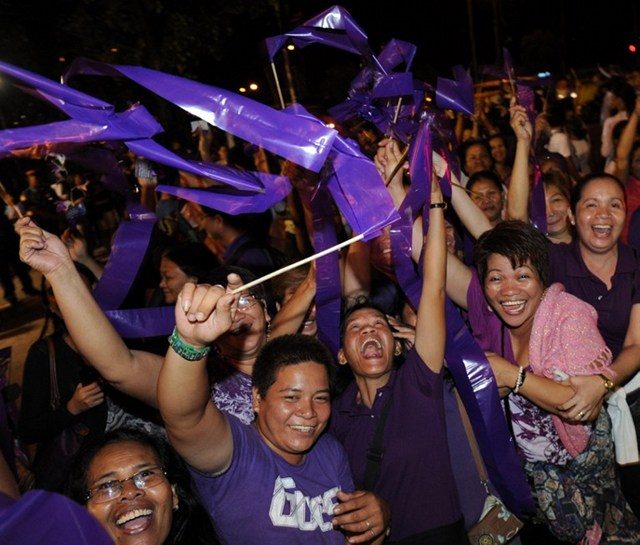
I say after the law, I’ve done my part and the most I can do is look into it in my oversight capacity. The Department of Health itself is still taking a hands on approach and working directly with the local governments, which I think is the best thing to do for now. It’s a big budget program so it’s good that DOH keeps a handle on it. I do highly recommend that they audit, do their self-audit very carefully to be sure that if they ship products out to provinces, it gets to recipients. It’s basic.
It’s the same problem you’ll face with any other big budgeted program. At the end of the day, it’s a problem we put upon ourselves. We didn’t just wake up with this. It takes a generation. Thirty years ago, we didn’t have this kind of population issue so we have to deal with this.
Let’s go to the MDGs. One of the goals the Philippines will likely not achieve is the one on reducing maternal mortality. Where does the difficulty lie?
I’m really sad about that. That was something we were harping about in the Reproductive Health law debates. At that time, we were not on target. In fact, at the height of the debates, the maternal mortality rate even went up. I am disappointed and I do attribute that to a solid decade of neglect on the status of women when it comes to their maternal health. That was sadly, highly influenced by the personal, religious beliefs of officials then.
Which is why I will always harp on the importance of the separation of Church and state. It is not enough that you do post-pregnancy planning. What I mean by that is after the woman gives birth and they say, “No problem. We have more hospitals. We have more lying-in clinics.” Yes, but it’s her 10th child! We didn’t help her prior to the pregnancy period to help her plan her family.
Many people do not know that child mortality rate is directly linked to maternal mortality rate. Although it appears that we are okay with our child mortality rate, if you further dissect that, young children are aged 0 to 5 and you can further dissect that to birth to 1 month, and our birth to 1 month ratio is bad as well. That’s because these women who are at risk of dying or complications during their pregnancies also give birth to high-risk infants.
The report said the RH law will help make a dent. Do you see a direct impact?
I believe without a doubt that it will make a serious dent. Many people do not understand that the Reproductive Health law is quite comprehensive. The debates brought to the public’s attention usually focused on the fact that the law provided for contraceptives to be made available to couples, to families in all public facilities and so people thought RH law is just about contraceptives.
When in fact, we address the need to attend to women’s reproductive health issues. These are all kinds of women-specific cancers, women-related ailments that are related to their reproductive health. A lot of these will be covered by this law and I do feel strongly if it is implemented that you will see a change in even half a generation.
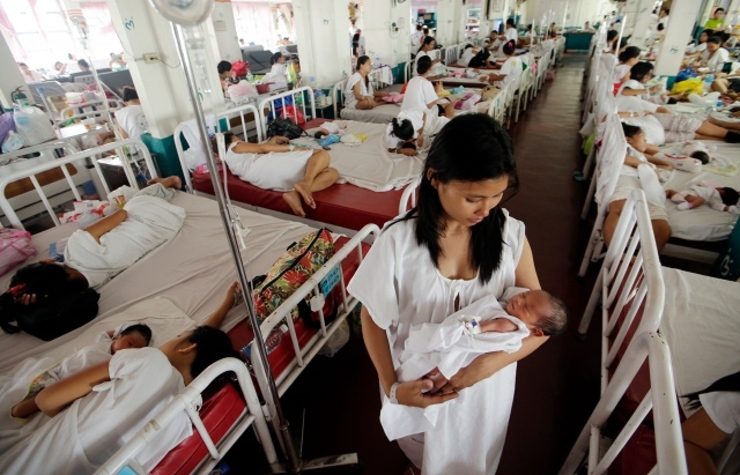
Another MDG where we’re faring poorly on is political participation of women. Why can’t we get enough women in government?
I just don’t think it’s being discussed as much as it should be. There’s this presumption that it’s not an issue, that it’s not a concern. Precisely because, “Wow, in Asia, you’re one of the few that have had a woman president.” We actually have a woman Chief Justice. The women in the Senate or Congress in general are visible enough to know that we’re there. But you’ll realize there’s not enough ratio-wise. What we need is the same kind of bottom-up education, awareness campaigns.
This also has to do with a weak political party system. In strong political parties in other countries, they look into the budget. How much budget does the political party allocate to strengthen the women? How much budget is allocated in media to educate voters on the need for women representatives, on the need for communities to start preparing young leaders?
We don’t have that set-up. In the same way that there are NGOs that have done wonders for women’s reproductive health rights, it’s high time we start campaigning in that direction also: participation in public governance.
What is it like being a female legislator pushing for women’s rights? Do you encounter discrimination?
Because men are used to having a few voices of women there, I did not encounter anything similar to the blatant discrimination that colleagues of mine in the international scene have. What I do have a richness of experiences in is the fact that a lot of my issues they find funny. They laugh at it. As we all know, laughter is either a sign of discomfort or a sign that something is not serious. Either way, I don’t appreciate my issues being laughed at.
From breastfeeding to the fact that I am always on women’s issues, more of in the past, not so much now but you can feel them saying, “Ayan na naman, tungkol na naman sa women’s empowerment.” (Here she goes again harping on women’s empowerment.) I don’t mind as long as it helps raise awareness. I don’t mind being labeled as the person who fights for women’s rights.
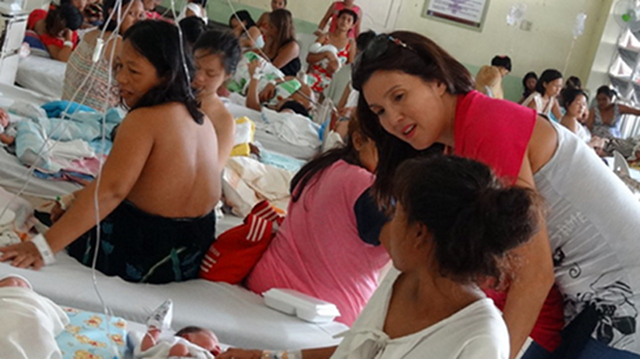
What’s next for women’s rights in the Philippines? I understand you’re working on amending the Family Code to take out discriminatory provisions.
The difficulty is the law historically – and this is present in many laws all over the world – the law gives the authority to the men or the father to make final decisions. We’re now saying it should be both. That’s causing a bit of a problem because for certain acts to have validity, let’s say when you enter into a contract with a 3rd party, the assumption is that the father can make the decision for the woman under the law.
But when we were looking at it, I said, nowadays, most couples make the decision as a team. Gone are the days when the wife is just quiet. Many times the woman decides like when it comes to school matters. So in practice, the decisions are actually made by the women and yet the law says in case of disagreement, it’s the husband’s decision that prevails.

The more serious ones are the laws that have a different definition on what marital infidelity is. It’s easier to prove marital infidelity when the woman commits it. It’s harder to prove it when it’s a man.
The UN Human Rights Committee recommends that we ease up on abortion laws to save the life of a woman. But there’s still great controversy because of the Church’s opposition. What are the chances?
Actually, if you ask any doctor on the practice of for example, an ectopic pregnancy, that is already a given practice that they save the life of a mother because that baby will not grow into a full baby because it’s ectopic. In as much as I’d like to codify that, to make it clear under the law, I don’t feel we are that mature to discuss this soon after the RH law.
I’m not going to go into it now because after what I saw are their violent reactions to things like that, we might end up in a situation where I diminish the existing rights of women just because at any given time, there might be other legislators who have very stringent views and even contradict current practice. Currently, the practice is to protect the lives of women. I’m comfortable with that for now. There are other circumstances that sadly, we’re not even dealing with. I just feel the timing isn’t right yet.
What about divorce?
Divorce is part of the review we’re doing on the discriminatory laws towards women. We do have Article 36 [of the Family Code], which is psychological incapacity as grounds for annulment so we’re looking at that, and there are some bills that have been filed. We’re studying that. I do hope to come up with a committee report soon.
What does the Philippines experience say about where women are at today?
We’re in a pretty decent place and I can say that now because of the Reproductive Health law. Without it, I would be very uncomfortable saying that because the one very important component, because biologically, that’s what a woman does: she gives birth. To deny her of all the protection she can have because it’s related to her sexual function and that’s a taboo function to some churches, to me was really unacceptable.
But can it be better? Of course! It’s like you’re saying you’re happy with your kids eating 3 meals a day. You aspire for more. You aspire for comfort, for them to hold the stars in their hands. Will all these mothers now be able to plan their families? Not necessarily because it will take time for the Reproductive Health law to be rolled out and for it to really have an effect on their family.
What are the role models these young girls are seeing? A lot of these women are victims of violence, victims of trafficking. A lot of their mothers did not have a choice to explore their options and be a working mother. They probably got married early and didn’t even get to finish school. Even the role models of this next generation of young girls are limited.
So I have cautious optimism about our future. We are laying the groundwork but the work doesn’t stop. We have to keep moving forward and keep being vigilant in ensuring the laws we made are being implemented, and these 100 million Filipinos, how can you be sure these laws are touching the lives of every child? How do we ensure that? It’s not an easy job. – Rappler.com
Rappler multimedia reporter Ayee Macaraig is a 2014 fellow of the Dag Hammarskjöld Fund for Journalists, which aims to expand the partnership between the United Nations and the media to promote human rights, freedom and development.
Add a comment
How does this make you feel?
There are no comments yet. Add your comment to start the conversation.